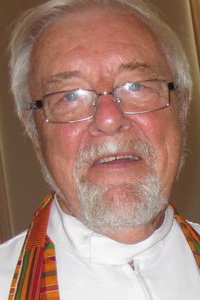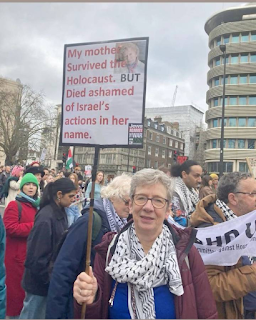George Hrbek - an Amazing Man - I was Lucky to Briefly Meet (through Zoom)
6/27/31 - 2/19/23
I’m deeply saddened to learn of the death of George Hrbek yesterday, February 19, 2023. I’m very glad that I moved forward to co-produce a workshop featuring him - November 15, 2022 - which is available to watch on YouTube at:
https://www.youtube.com/watch?v=ETxMm4R5Rs8
.
One can also learn more of George’s amazing life at:
https://voicesforjusticecle.wordpress.com/2015/03/13/background-on-rev-george-hrbek/
https://medium.com/@burnett-lynn/in-memoriam-for-george-hrbek-a-life-of-radical-hope-a8eebfe73b0e
George, at 91, was a role model for me, and perhaps
all of us! He spoke of Sexism being
important,, along with Racism. He
wanted to listen and learn from the younger people, including much, much
younger than both he and I. He was
gentle, but strong and assertive, also.
He had a sense of humor.
He was so, so much - that words fail me in describing
him! To work to ally Black and white
churches in Selma, Alabama - from 1958-1961 was amazing - incredible,
even! To then - become a friend and
ally of Fred Hampton in Chicago in the years before he was murdered by the
Chicago Police - with the FBI deeply involved - working on racism and worker’s
rights set an huge positive example for
all of us.
I, like most of us, had never heard of George Hrbek,
until I got an invitation - to his (Zoom based) 91st Birthday Party
- which was an invitation to get to know him a little. I reached out to his ally and friend Lynn Burnett
- to try to plan a workshop - so we could hear his voice more deeply.
I’ve said enough!
My tears are intense! I’m
sad! I feel lucky - to have been
involved in a tiny snippet of his amazing life!
Social justice giant George Hrbek dies at 91

Rev. George Hrbek, a social justice giant in Northeast Ohio and former head of Lutheran Metropolitan Ministry, died over the weekend. He was 91.
The Lutheran pastor spent much of the civil rights era in Alabama where he attempted to desegregate churches. Hrbek helped create the Selma chapter of the Southern Christian Leadership Conference, a civil rights organization founded by Martin Luther King Jr.
“In advocacy or social services, more and more people today think of, you got to include people in all parts of the planning that you’re trying to serve,” longtime family-friend Michael Sering said. “George has been doing that for 70 years.”
Hrbek had a personal relationship with King. Hrbek moved from Alabama to Chicago, where he worked to educate other white people about allyship and racism. His messages were often advised by King, who was also working in Chicago at the time.
In the early 1970s, Hrbek was hired as one of the first staff members of Lutheran Metropolitan Ministry, a Cleveland social services organization that began operating the 2100 Lakeside Men’s Shelter when Hrbek became the ministry’s interim executive director.
Hrbek was brought into the Lutheran Metropolitan Ministry fold by Rev. Dick Sering, co-founder of the ministry and Michael Sering’s father.
The families were very close. Michael Sering, who was babysat by Hrbek’s children, is now the ministry’s current vice president of housing & shelter. He said Hrbek was the perfect person to manage the shelter.
“Talking to the guys at the shelter. What did they need? What can we do better? How do we advocate? What services? And it was such a good launch to bring the culture that was necessary and helpful,” Sering said.
Sering described Hrbek as bold and said he lacked fear of consequences.
“He was ‘roll up the sleeves, let’s make stuff happen,’” Sering said. “He’d been arrested multiple times for advocacy and demonstrations and every thing else and that was the least of his worries.
Hrbek hired Charles See to work for Lutheran Metropolitan Ministry in the 1970s. The two became close friends.
“If it was racial injustice, George was at the forefront,” See said. “And always challenging white folks standing in the way of that.”
See says Hrbek was never afraid to step up to institutions that stood in the way of equality.
“He would always point out where Jesus stood. That Jesus stood with the poor, with the forgotten and the oppressed. And he said that’s where he belonged. That was his ministry,” See said.
Hrbek was an activist until the end – advocating last month at City Council for residents to control how part of Cleveland’s budget is spent.
Just after this 90th birthday, Hrbek did an extensive interview with historian Lynn Burnett.
“When we think in the days ahead and the years ahead, we certainly will remember George,” See said. “We’ll be encouraged and his example will continue to be there to spur the best of us on.”
(Lynn Burnett's words - below):




Comments
Post a Comment